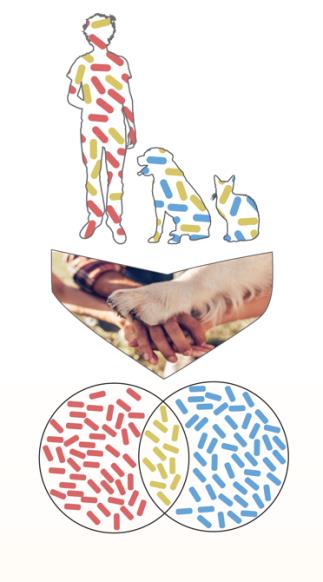Risk of companion animal to human transmission of antimicrobial resistance during different types of animal infection
Interventions
Surveillance
Transmission
- Constança Ferreira Pomba, University of Lisbon, Portugal (Coordinator)
- Stefan Schwarz, Friedrich-Loeffler-Institut, Germany (Partner)
- Scott Weese, Ontario Veterinary College at the University of Guelph, Canada (Partner)
- Anette Loeffler, Royal Veterinary College, RVC, United Kingdom (Partner)
- Vincent Perreten, University of Bern, Switzerland (Observer)
PETRISK PROJECT evaluated the frequency and the public health importance of the sharing of resistant bacteria between dogs, cats and humans living in close contact. How was this done? Study case enrolment - Dogs, cats and humans living in contact were recruited. The enrolment of participants took place in Portugal and the United Kingdom. Sharing of bacteria - The samples collected from companion animals and their owners were used to evaluate the presence of multi-resistant bacteria as well as the occurrence of transmission between humans and animals. Risk analysis - Established control measures that might help to limit the dissemination of resistant bacteria from companion animals. What questions were answered? Is there transmission of similar bacteria and/or antibiotic resistance genes to humans during companion animal with UTI? NO Is there transmission of similar bacteria and/or antibiotic resistance genes to humans during companion animal with SSTI? YES What is the extent of the risk of human colonization? As far as we have learned it exists but is LOW! Does the transfer of antimicrobial resistance from companion animals to humans in contact occur more frequently during animal infection? YES Which types of infection promote a higher risk of transmission, skin and soft tissue infections (SSTIs) or urinary tract infections (UTIs)? SSTIs What measures are advised to control the transfer of antimicrobial resistance from companion animals to humans in contact? Wash hands after contact with your pet if is sick with a resistant bacteria and under antimicrobial treatment, were gloves for procedures, clean surfaces, avoid direct contact during the treatment (no kissing, no sleeping in the same bed).
- Veterinary Microbiology, 2019. Clonal relatedness of Proteus mirabilis strains causing urinary tract infections in companion animals and humans
- Journal of Antimicrobial Chemotherapy, 2019. Klebsiella pneumoniae causing urinary tract infections in companion animals and humans: population structure, antimicrobial resistance and virulence genes
- Microbial Drug Resistance, 2020. Sharing of Clinically Important Antimicrobial Resistance Genes by Companion Animals and Their Human Household Members
- Journal of Antimicrobial Chemotherapy, 2019. Emergence of Escherichia coli ST131 H30/H30-Rx subclones in companion animals
- Chapter in Advances in Animal Health, Medicine and Production, 2020. The Public Health Risk of Companion Animal to Human Transmission of Antimicrobial Resistance During Different Types of Animal Infection
- Chapter in Advances in Animal Health, Medicine and Production, 2020. The Gut Microbiome and Antimicrobial Resistance in Companion Animals
- Microbiology Research, 2023. Detecting mecA in Faecal Samples: A Tool for Assessing Carriage of Meticillin-Resistant Staphylococci in Pets and Owners in the Microbiological ‘Fast Age’?
- European Journal of Clinical Microbiology & Infectious Diseases, 2023. Longitudinal study of ESBL/AmpC-producing Enterobacterales strains sharing between cohabiting healthy companion animals and humans in Portugal and in the United Kingdom
- Journal of Infection and Public Health, 2023. Dissemination of bla NDM-5-carrying IncX3-type plasmid among non-clonal Escherichia coli strains colonising a dog with a skin infection caused by a carbapenem-resistant Klebsiella pneumoniae, United Kingdom
- Frontiers in Microbiology, 2024. Transmission dynamics of ESBL/AmpC and carbapenemase-producing Enterobacterales between companion animals and humans
- Chapter in Advances in Animal Health, Medicine and Production, 2020. Antimicrobial Resistance Trends in Dogs and Cats with Urinary Tract Infection
- Microorganisms, 2020. Genes on the Move: In Vitro Transduction of Antimicrobial Resistance Genes between Human and Canine Staphylococcal Pathogens
- Journal of Veterinary Internal Medicine, 2020. Extended‐spectrum‐beta‐lactamases‐ and carbapenemase‐producing Enterobacteriaceae isolated from the gut of sick companion animals in Portugal
- Journal of Veterinary Internal Medicine, 2020. Plasmid‐mediated colistin resistance mcr‐1 gene harbored on multi‐drug resistant isolates from companion animals in Portugal
- Chapter in Advances in Animal Health, Medicine and Production, 2020. The Public Health Risk of Companion Animal to Human Transmission of Antimicrobial Resistance During Different Types of Animal Infection
- Chapter in Advances in Animal Health, Medicine and Production, 2020. The Gut Microbiome and Antimicrobial Resistance in Companion Animals
- Chapter in Advances in Animal Health, Medicine and Production, 2020. Antimicrobial Resistance Trends in Dogs and Cats with Urinary Tract Infection
- J Antimicrob Chemother, 2021. Two high-risk clones of carbapenemase-producing Klebsiella pneumoniae that cause infections in pets and are present in the environment of a veterinary referral hospital.
- Antimicrob Agents Chemother, 2020. OXA-181-Producing Extraintestinal Pathogenic Escherichia coli Sequence Type 410 Isolated from a Dog in Portugal
- Journal of Clinical Microbiology, 2019. Evidence of Sharing of Klebsiella pneumoniae Strains between Healthy Companion Animals and Cohabiting Humans
- Journal of Clinical Microbiology, 2021. Driving Laboratory Standardization of Bacterial Culture and Antimicrobial Susceptibility Testing in Veterinary Clinical Microbiology in Europe and Beyond
- Eurosurveillance, 2022. mcr-1 colistin resistance gene sharing between Escherichia coli from cohabiting dogs and humans, Lisbon, Portugal, 2018 to 2020

- PET-Risk project website
- PET-Risk project on RVC research news
- Laboratory of Antibiotic Resistance website
- Worms & germs blog by project partner Professor Scott Weese
News articles
- Interview in the Telegraph 2021-07-10: Nightmare scenario: Potentially untreatable superbug being passed from dogs to owners
- MedicalResearch.com 2021-07-11: Pets can pass genes for antibiotic resistance to human infections
- EurekAlert! 2021-07-10: Resistance to last-resort antibiotic may be passing between pet dogs and their owners
